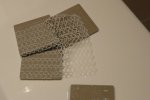Am considering tiling my diy pool (my-self-build-ferrocement-pool-t28358.html) and have been weighing up the likely costs and have a few questions if anyone could help please.
Have been told that tiling on its own does not waterproof a pool. If epoxy grout is used, is this still the case?
Due to the high percentage of metal and relatively thin cover of mortar over it, a sealant or waterproofer seems imperative unless
epoxy grout combined with the tiles will provide a suitable barrier.
If not then a waterproof membrane is going to be needed. Have been advised that a Styrene-Butadyne-Rubber waterproofer would be best.
The Epoxy sounds like it is very difficult to use by the inexperienced and is very expensive. Cement based worries me for longevity etc and may cause a build up of calcium on the tile at water level which cant be got off without sand blasting (apparently).
Does anyone know what would be the best combo for cost/longevity/ease of application ( I am a reasonably proficient tiler).
I know there are also issues of tile backing meshes and tiles suitable for pools etc.
thanks
Have been told that tiling on its own does not waterproof a pool. If epoxy grout is used, is this still the case?
Due to the high percentage of metal and relatively thin cover of mortar over it, a sealant or waterproofer seems imperative unless
epoxy grout combined with the tiles will provide a suitable barrier.
If not then a waterproof membrane is going to be needed. Have been advised that a Styrene-Butadyne-Rubber waterproofer would be best.
The Epoxy sounds like it is very difficult to use by the inexperienced and is very expensive. Cement based worries me for longevity etc and may cause a build up of calcium on the tile at water level which cant be got off without sand blasting (apparently).
Does anyone know what would be the best combo for cost/longevity/ease of application ( I am a reasonably proficient tiler).
I know there are also issues of tile backing meshes and tiles suitable for pools etc.
thanks


